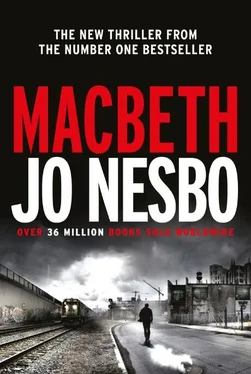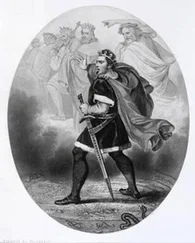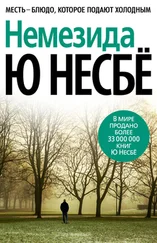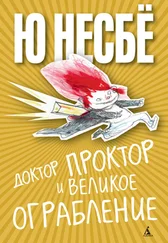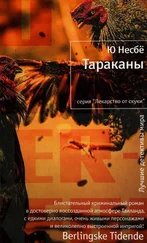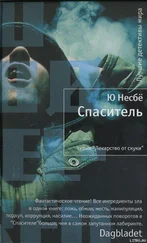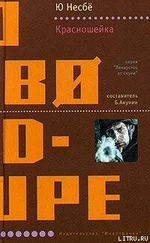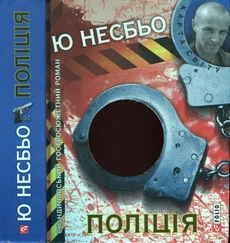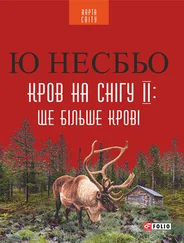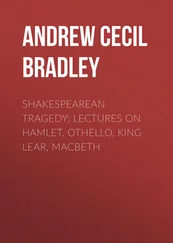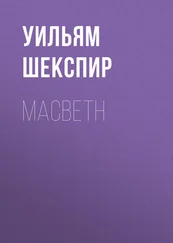Jack shrugged. ‘It’s not just that. In fact, I think being a receptionist suits me better than being a croupier. So it’s no tragedy.’
‘But don’t you earn a good deal more as a croupier?’
‘If you’re a fish out of water, it doesn’t matter how much you earn. The fish can’t breathe and dies beside a fat bagful of money. That’s a tragedy, sir.’
Macbeth was about to answer when a voice announced that he had got through to Patrols.
‘Macbeth here. I was wondering if you’d had any reports about a shooting in Gallows Hill during the last hour.’
‘No. Should we have done?’
‘We have a customer here who said he’d just driven by and heard a loud bang. Must have been a puncture.’
‘Must have been.’
‘So there’s nothing in District 2 West?’
‘Only a break-in at a jeweller’s, sir. The closest patrol car was some distance away, but we’re heading there now.’
‘I see. Well, have a good evening.’
‘You, too, Inspector.’
Macbeth rang off. Stared down at the carpet, at the strange needlework, the flowery shapes. He had never thought about them, but now it was as if they were trying to tell him something.
‘Sir?’
Macbeth looked up. Jack had a worried expression on his face.
‘Sir, you’ve got a nosebleed.’
Macbeth put a hand to his top lip, realised the receptionist was right and hurried to the toilet.
Banquo accelerated down the main road. The wind howled outside the doorless passenger side. They passed the Obelisk. It wouldn’t be long before they were at the central station now.
‘Can you see them?’
Fleance said something.
‘Louder!’
‘No.’
Banquo couldn’t hear in the ear on Fleance’s side, either because the auditory canal was blocked with blood or because the bullet had taken his hearing as well. However it wasn’t that shot which bothered him. He looked at the petrol gauge — the indicator had dropped remarkably in the four or five minutes since they had left the shopping area. The machine guns might have sounded harmless, but they had holed the petrol tank. But it wasn’t those shots that bothered him either; they had enough petrol to get to the Inverness and safety.
‘Who are they, Dad? Why are they after us?’
There, in front of them, was the central station.
‘I don’t know, Fleance.’ Banquo concentrated on the road. And breathing. He had to breathe, get air into his lungs. Carry on. Carry on until Fleance was safe. That, and nothing else, was what mattered. Not the road that had begun to blur in front of him, not the shot that had hit him.
‘Someone must have known we would come that way, Dad. The traffic lights, that wasn’t normal. They knew exactly when we would pass Gallows Hill.’
Banquo had worked that one out. But it meant nothing now. What did mean something was that they had passed the central station and that the lights of the Inverness lay before them. Park in front of the entrance, get Fleance inside.
‘I can see them now, Dad. They’re at least two hundred metres behind us.’
More than enough if they didn’t get held up. He should have had the blue light and the siren in the car. Banquo stared at the Inverness. Light. He could drive across Workers’ Square at a pinch. The sirens. Something stuck in his throat. Stuck in his mind.
‘Did you hear any sirens, Fleance?’
‘Eh?’
‘Sirens. Patrol cars. Did you hear them at the jeweller’s?’
‘No.’
‘Absolutely sure? There are always loads of patrol cars in District 2 West.’
‘Absolutely sure.’
Banquo felt the pain and darkness come. ‘No,’ he whispered. ‘No, Macbeth, my boy...’ He held the wheel and turned left.
‘Dad! This isn’t the way to the Inverness.’
Banquo pressed the horn, pulled the Volvo out from behind the car in front and accelerated. He could feel the paralysing pain from his back spreading to his chest. Soon he wouldn’t be able to keep his right hand on the wheel. The bullet probably hadn’t made a big hole in the seat, but it had hit it. And that was the shot that worried him.
In front of them there was nothing. Only the container harbour, the sea and darkness.
But there was one last possibility.
Macbeth studied himself in the mirror above the sink. The bleeding had stopped, but he knew what it meant. That his mucous membranes couldn’t take any more brew, and he should give it up for a while. It was different when he was young: then his body could take any amount of punishment. But if he continued now his nose would ache and bleed and his brain would spin until his head unscrewed itself from his neck. What he needed was a break. So why, thinking this, did he roll up a banknote and place it at the right-hand end of the line of powder on the sink? Because this was the exception. This was the critical point when he needed it. The point when he had to tackle the fat perverted mayor on the one side and the Norse Rider brigand who it seemed hadn’t managed to keep to their agreement on the other. And Lady on the third. No, she wasn’t a problem, she was the alpha and the omega, his birth, life and death. His reason for being . But just as their love could give him a tremulous joy, he could also feel the pain when he thought of what might be taken from him — her power now consisted in not loving him as much as loving him. He inhaled, sucked the brew up into his brain, hard, until it hit the inside of his scalp, or so it felt. Again looked at himself in the mirror. His face contorted and changed. He had white hair. A woman’s red lips. A scar grew across his face. New chins extended under his chin. Tears filled his eyes and ran down his cheeks. He had to stop now. He had seen people who had sniffed so much they had ended up with prosthetic noses. Had to stop while there was still time, while there was something to save. He had to switch to a syringe.
The sergeant saw the rear lights of the Volvo gradually coming nearer. He opened the throttle knowing the others would find it difficult to keep up now even though his engine was only 450 cc. On wet oily tarmac experience and sensitivity were more important for road-holding than engine size. It was therefore with some surprise that he saw a bike approaching fast in his mirror. And with disbelief he recognised it. And the rider’s helmet. The red Indian Chief passed so close to the sergeant that the point of a horn almost brushed against him. His headlight was reflected in the sabre when the bike overtook him. Where had he come from? How did he know? How did he always know when they needed him? The sergeant slowed down. Let Sweno ride at the front and lead them.
Banquo drove the same way they had when they were following the Russian lorry, overtaking dangerously a couple of times and temporarily increasing their distance from the motorbikes. They would soon catch up again, but perhaps there was still time. There was a barrier in front of the tunnel and a sign to say the bridge was closed due to repairs. Splinters flew as the front of the Volvo smashed into the barrier and its headlights bored into the tunnel’s darkness. He drove with one hand on the wheel; the other lay in his lap like a corpse. They could already see the exit when they heard the angry yapping of the motorbike engines entering the tunnel behind them.
Banquo braked approaching the sharp bend onto the bridge and then speeded up again.
And soon they were out on it, to a sudden silence beneath a clear sky and in the moonlight, which made the river glitter like copper below, far beneath them. All that could be heard was the Volvo’s engine working as hard as it could. And then the whine of rubber on tarmac as Banquo braked suddenly in the middle of the bridge where the statue of Kenneth had once been and turned onto the shoulder where the breeze flapped the Highway Agency’s red cordon tape, marking the spot the ZIS-5 had plunged down with the railing. Surprised, Fleance turned to his father, who had put the car into neutral. Banquo leaned over his son with a pocket knife in his hand and cut his seat belt.
Читать дальше
